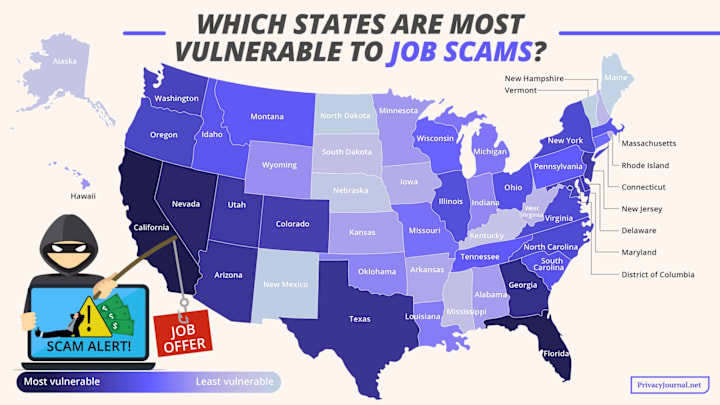You never want to see a scam in your inbox, but job scams can be especially devastating. According to USA TODAY, the Federal Trade Commission found that money lost to such fraud increased threefold from 2020 to 2023. The financial toll of people falling for fake calls and messages related to employment reached $220 million in the first half of 2024. Some states are more susceptible to these scams than others, as you can see from the map below.
Security product review site PrivacyJournal analyzed all 50 states and Washington D.C. and measured their vulnerability to job scams. Researchers weighed various factors, such as the number of job scam reports and unemployment rates, using regional data from the Federal Trade Commission and the Bureau of Labor Statistics.

The website found that high-population states are at especially high risk, with Californian residents being the most vulnerable to job scams. According to the report, contributing factors could be the Golden State’s high unemployment rate (the second highest in the country) and expensive living costs. Such circumstances may make residents more desperate to find a job and, therefore, more likely to fall for scams.
Florida lands second on the list. Though its unemployment rate is low compared to most other states, the state’s high population and above-average living expenses may have contributed to its high ranking.
Nevada is the third-most vulnerable state on the map. Unfortunately, it has the most job scam reports per million people and the highest unemployment rate in the U.S. Here are the rest of the states most susceptible to this type of crime:
The 10 Worst States for Job Scams
- California
- Florida
- Nevada
- Washington, D.C.
- Georgia
- Texas
- Arizona
- Utah
- New Jersey
- Colorado
Increased financial strain isn’t the only negative impact that fraud victims face—their mental health also suffers. The Guardian reports that anxiety, depression, and low self-esteem are common symptoms.
The best way to protect yourself from job scams is to be informed. The Federal Trade Commission’s Consumer Advice page provides examples of such scams—like an “employer” asking you to ship something or resell merchandise—so you know what to look out for. The site also covers ways to avoid such scams, such as asking someone you trust to see if a job post sounds legitimate and searching the supposed company with the words “scam,” “review,” or “complaint.”
Discover More Maps:
